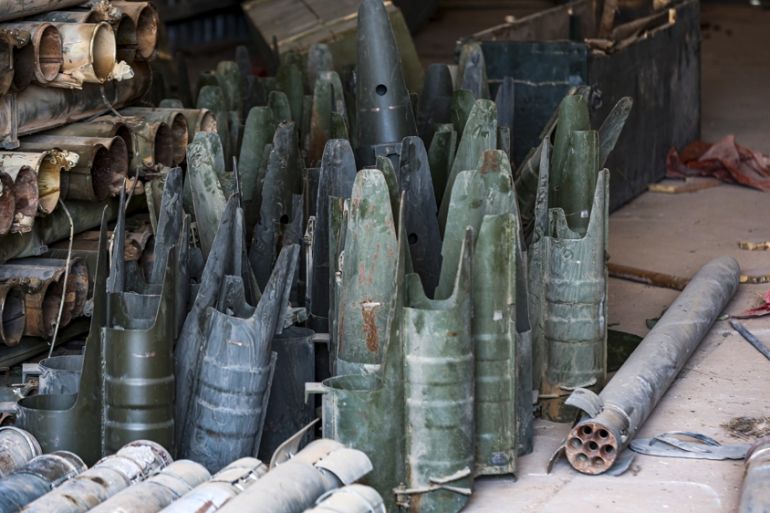Libya: Haftar bans flights, boats from Turkey
Renegade general’s threat come as Washington investigates how US-made weapons got into the hands of his fighters.

Libya’s renegade military commander Khalifa Haftar has banned commercial flights from Libya to Turkey and ordered his forces to attack Turkish ships and interests in the country, spokesperson Ahmed al-Mismari has said.
Turkey supports Libya’s United Nations-recognised Government of National Accord (GNA) in Tripoli which on Wednesday retook Gharyan, a strategic town south of the capital, from Haftar’s self-styled Libyan National Army (LNA).
Keep reading
list of 4 itemsCIA chief visits Libya after Lockerbie suspect handover
Libya: Violence to Votes
In Libya, anger and uncertainty after polls delayed
“Orders have been given to the air force to target Turkish ships and boats in Libyan territorial waters,” al-Mismari said on Friday, adding that “Turkish strategic sites, companies and projects belonging to the Turkish state (in Libya) are considered legitimate targets by the armed forces”.
Al-Mismari said Turkish aircraft “provided air cover” and bombed LNA positions in the fight for Gharyan.
“All flights to and from Turkey are also stopped and any Turkish (nationals) on Libyan territory will be arrested,” he said.
|
|
Turkey has supplied drones and trucks to forces allied to Tripoli-based Prime Minister Fayez al-Sarraj, while the LNA has received support from France, the United Arab Emirates and Egypt, according to diplomats.
The LNA, which is allied to a parallel government in the east, has failed to take Tripoli but it has commanded air superiority. It has several times attacked Tripoli’s functioning airport.
Haftar setback
The capture of Gharyan this week has been seen as a major setback for Haftar’s forces and their campaign to capture the capital.
Al-Mismari said his forces had lost 43 soldiers in the battle for Gharyan.
Ahmed Milad, a pro-GNA fighter, told Al Jazeera: “We coordinated with our fellow fighters inside the city [Gharyan] along with the western region military command to set the incursion. It took us weeks, but the city fell into our hands in about seven hours.”
#Libya: Weapons captured from #LNA when the #GNA captured Garyan, including M79 Osa, HMGs, a 9K113, and at least 4 FGM-148 Javelin!
Also included was Chinese GP-1 155mm Guided Artillery Shells, known to be in Libya & other arms marked as from the UAE.
Partially via @Oded121351 pic.twitter.com/aEksokPl8G
— Cᴀʟɪʙʀᴇ Oʙsᴄᴜʀᴀ (@CalibreObscura) June 28, 2019
Following the battle, GNA forces said they discovered a cache of US-made missiles at a captured LNA base in the city.
Speaking from Gharyan following the battle, Al Jazeera correspondent Mahmoud Abdelwahed said: “Government forces showed off dozens of US-made anti-tank missiles. They said [the weapons] were seized from Haftar’s forces in Gharyan … [and] were supplied by the UAE.”
Markings on the missiles’ shipping containers indicated that they were originally sold to the UAE, a US ally, in 2008.
If the UAE did provide the weapons, it would likely be a violation of arms sales agreements with the US, as well as a United Nations embargo.
“The rule is that if the US sells [weapons] to the UAE or to another country, the UAE is not then allowed to sell it to someone else – be that another country or perhaps a state under UN sanctions, or in this case, apparently, a warlord who is also under UN sanctions,” Al Jazeera’s Rob Reynolds, reporting from Washington, DC, said.
A spokesperson of the US State Department said in a statement sent to Al Jazeera: “We take all allegations of misuse of US origin defence articles very seriously.”
The statement added: “We are aware of these reports and we are seeking additional information. We expect all recipients of US origin defence equipment to abide by the end-use obligations.”
Fear of retaliation
While life has slowly started to return to normal in Gharyan, locals fear Haftar may retaliate.
|
|
“Some of Haftar’s forces have retreated to the nearby town of Asabia, others to the city of Tarhouna,” Al Jazeera’s Abdelwahed said.
“But the situation in Gharyan remains tense as people worry that Haftar’s warplanes could target government forces within the city.”
The LNA still holds the town of Tarhouna southeast of Tripoli, its second main position in the month-long campaign to seize the capital.
Haftar and his backers say they are trying to free Tripoli from militias which they blame for destabilising Libya since the fall of Muammar Gaddafi in a NATO-backed uprising in 2011.
Haftar’s critics accuse him of trying to seize power through force and deepening a conflict between factions based in the east and west of the sprawling North African country.
His offensive has upended UN-led plans to stabilise Libya after years of conflict that have left the oil-rich nation divided and caused living standards to plummet.
Western powers have become increasingly concerned about the conflict as it risks disrupting oil production and prompting more migrants to leave for Italy and other parts of Europe by boat.
|
|